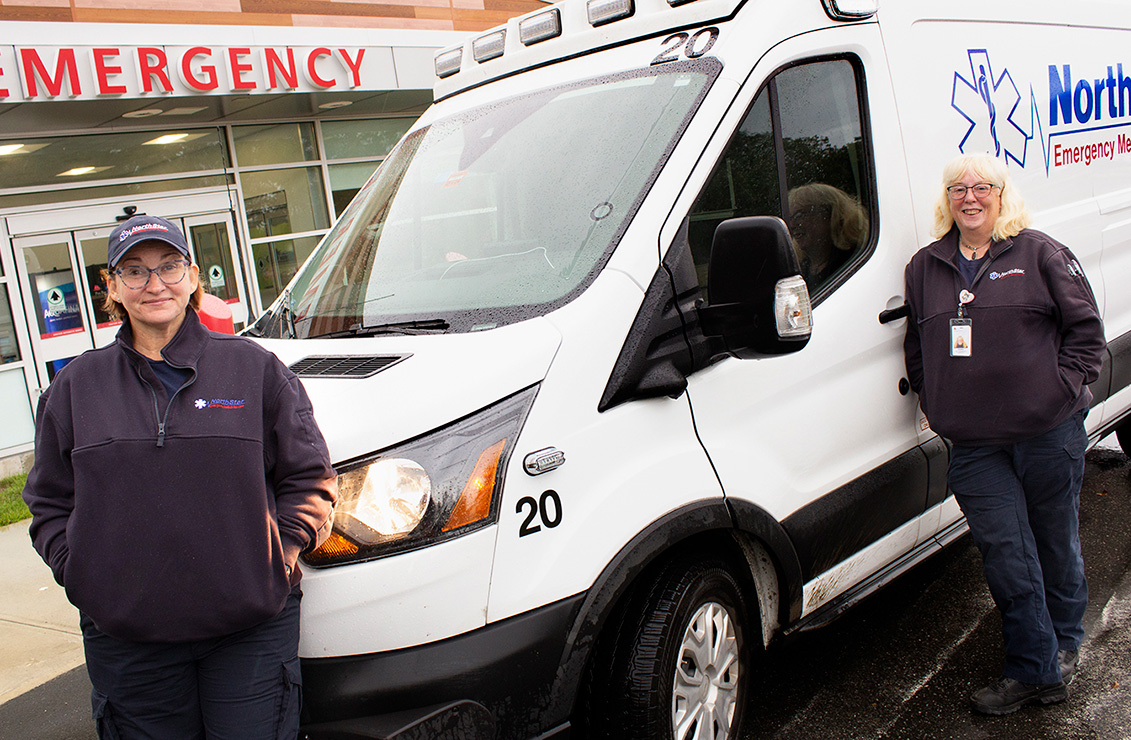Clinical Expansion

Tamra Ballance, EMT (left) and Donna Weare, EMT (right)
Streamlining Interfacility Transports
When Mark McAllister, MD, entered an emergency department exam room at Pen Bay earlier this year, he knew the patient needed to be transported to Maine Medical Center for surgery. And fast. The patient had an aortic dissection, a tear deep in the body’s main artery that can quickly rupture and lead to almost immediate death.
That day however, weather had grounded LifeFlight helicopters, and the local ambulance service didn’t have any of the specialized crews needed to keep a patient stabilized during the two hour trip to Portland.
“So I had my secretary call our local EMS agency, and I said, ‘Get me someone who can drive the ambulance and knows where stuff is, and I’ll go,’” McAllister said.
In a state where strained local ambulance services have traditionally focused on 911 calls, McAllister’s heroics highlight long-standing challenges to providing timely interfacility transports. Recognizing the need for a more efficient approach, Pen Bay and Waldo have forged a partnership with NorthStar Ambulance to create a specialized fleet of ambulances dedicated solely to interfacility transports.
Leading that effort is Tyler Giberson, MD, chair of emergency medicine for Pen Bay and the MaineHealth Emergency Medicine Specialty Council. The goal, he said, “is to guarantee the ability to transport patients in an expedited timeframe by ambulance.”
NorthStar, a service of Franklin Memorial Hospital, acquired its first ambulance for the Pen Bay and Waldo fleet in late 2022 and a second one shortly after that.
The first order of business was to retro-fit the ambulances with equipment needed for interfacility transports. The vehicles, which arrived in the familiar red color scheme of a typical 911 ambulance, then had to be repainted to another color to reflect their largely non-emergency purpose. NorthStar also set out to hire 10 full-time and per diem paramedics and emergency medical technicians.
The new fleet completed its first interfacility transport in mid-February. Since then, it has completed more than 500 transports, mostly to Maine Medical Center. All those trips added up to more than 3,000 staff hours for the ambulance crews.
The initiative, which now serves as a model for other MaineHealth hospitals, has already yielded remarkable results. Patients waiting over three hours for a transfer out of the emergency department have seen a notable 25% reduction in wait time. This not only represents a significant advancement in patient care but also ensures that access to higher levels of medical attention is provided without unnecessary delay.
Giberson’s vision of a durable, state-wide, interfacility transport system resonates with a core mission: to be part of the solution that guarantees optimal emergency response and transport for years to come.
As for McAllister and his patient, the race against the clock to Maine Medical Center proved successful. The ambulance arrived at MMC just before 9 pm, paving the way for the patient’s aorta to be repaired after several hours of surgery.
McAllister expressed gratitude for the positive outcome for his patient, along with relief that such extreme measures are less likely to be necessary in the future – patients in need of interfacility transport can now access the care they require promptly and without unnecessary delays, thanks to this innovative health care collaboration.
Consolidating Primary Care at Waldo
This summer Waldo launched a renovation to the second-floor of the Biscone Building that will bring all primary care practices, as well as diabetes services, under one roof.
Until recently, those practices were spread out in three separate locations, all with different addresses. When the project is completed in early 2024, the consolidation to the second floor of the Biscone Building will make it easier for patients to navigate our campus and receive needed care.
 This consolidation approach is called the Medical Home Model, and is the same model the Beebe Health Center on the Pen Bay campus utilizes for its primary care departments. This model also improves the work our care team members do daily, making it easier for providers to communicate and collaborate in a more streamlined way.
This consolidation approach is called the Medical Home Model, and is the same model the Beebe Health Center on the Pen Bay campus utilizes for its primary care departments. This model also improves the work our care team members do daily, making it easier for providers to communicate and collaborate in a more streamlined way.
This centralized move will allow Waldo to continue to expand and utilize the empty spaces these departments used to occupy.
“These now vacant spaces are a blank canvas we can utilize not only for patients but also for our care team members,” said Tyson Thornton, PharmD, FACHE, vice president of operations for Pen Bay and Waldo. “This project opens more doors for our facility to build upon our commitment to providing the best care, close to home.”
Pen Bay ED Project Advances
Pen Bay Medical Center reached another milestone in its emergency department (ED) expansion project by opening its newest section on Monday, Sept. 18. This new space added 11 rooms to the ED, including eight exam rooms and a three-room behavioral health suite. Three of the exam rooms were fitted for behavioral health overflow as well. The medication room, clean supply and soiled utility rooms, as well as a nurses station, were also expanded in the project.
The work is part of a three-phase construction project that will nearly double the size of the ED from 9,000 to 15,000 square feet. When completed in 2024, the number of exam rooms will increase from 13 to 25.
With the new addition now open to patients, work has begun to renovate the fluoroscopy suite and two other x-ray rooms in the ED. This work is scheduled to be completed in early 2024 and will wrap up Phase 2 of the expansion project.
The renovation to the ED is necessary for several reasons, including advancements in emergency medicine that require more equipment and time but also lead to better outcomes for patients, especially those suffering a stroke or heart attack. There has also been a significant increase in the severity of cases requiring emergency care in recent years, as well as an increase in behavioral health cases.
The ED upgrade is part of the larger Campaign for Coastal Health — a $21.5 million capital campaign that also funded the construction of the Beebe Health Center on the Pen Bay campus. The health center, which brings together under one roof most of the hospital’s primary care practices, opened in December 2020.
The campaign contributed $5.1 million to the upgrade of the Pen Bay ED. MaineHealth has contributed more than $3.5 million to the project.
Pen Bay Expands Palliative Care Services
Pen Bay Palliative Care expanded its access to care services in 2023 after completing a two-year pilot project funded by a Harvard Pilgrim Healthcare Foundation quality improvement grant. The expansion reaffirmed our commitment to providing the most complete care for our patients and communities.
The grant funds allowed the program to grow from a hospital-based service to an ambulatory one that provides care to patients wherever needed. It also enabled us to add care team members and create educational opportunities for providers, thereby establishing the community-based component of the program.
“The grant work helped us see the importance of good quality community collaboration with other services and departments that work with this particular patient population. The data we tracked as part of the grant reinforced what we suspected, in that, the services we provide help reduce patient emergency room visits.”
– Kim Danforth, LMSW-cc, palliative care social worker
Pen Bay Palliative Care now includes Danforth; Marjorie Zyirek Bacon, MD, a board-certified palliative care physician; Karin McDonald, APRN-FNP, and Alana Rose, APRN-FNP, specially trained nurse practitioners; and Brooke Simmons, medical assistant.
The Pen Bay and Waldo palliative care programs provide specialized medical care for people at any age living with serious, life-limiting, illnesses. The team provides patient-centered care aligned with patient and family wishes. Palliative care services:
- Can be provided alongside curative treatment
- Support increased well-being
- Help patients and families better manage complex symptoms before they become worse
- Help patients avoid unnecessary hospital visits
“When people get referred to palliative care earlier, they do better because we can help better control their symptoms and manage their pain,” Danforth said. “This grant allowed us to be more of a presence in the community, with more support, help and care for a growing number of patients.”
What is palliative care?
Palliative care is specialized medical care for people living with a serious illness. The goal is to improve quality of life for both the patient and the family. Palliative care is provided in many different settings, including in the hospital, in outpatient settings and via telehealth.
